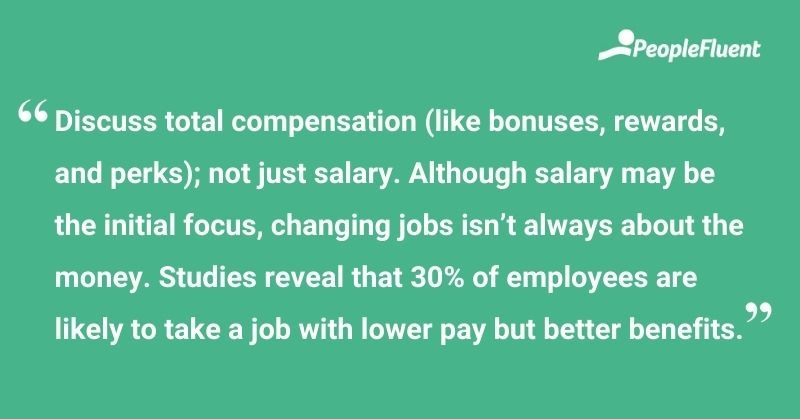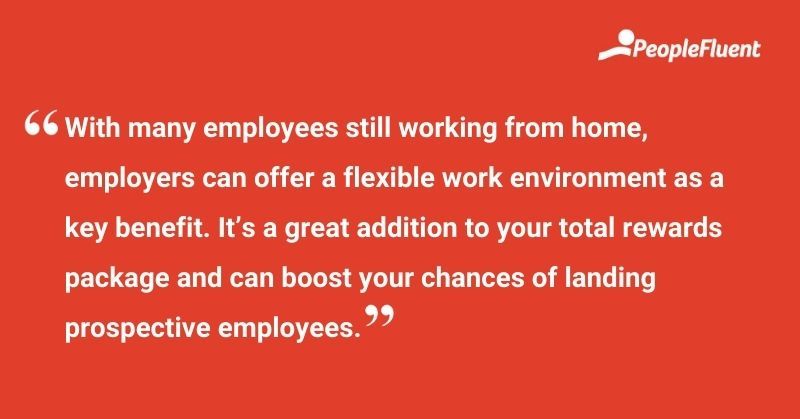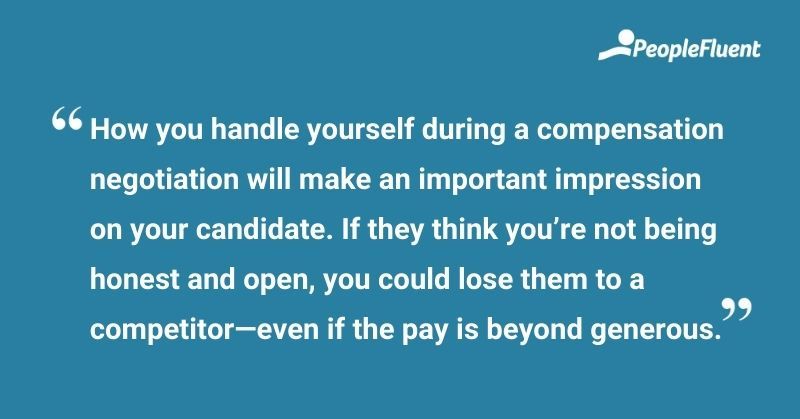Published: Sep 17, 2021Time to read: 7mins Category: Compensation
Having Difficult Hiring Conversations? Not Anymore! 5 Ways to Negotiate Compensation and Land Your Candidate
So you’ve found the perfect candidate to fill a key role—well done! There’s just one problem: the candidate wants more than your salary budget allows. Now you’re in a pickle. How can you navigate these difficult conversations about compensation, while also trying to secure top talent? Keep Reading for a few ideas.
It’s likely to be a candidate’s market for the foreseeable future. With that in mind, we don’t have to tell you that attracting and retaining top talent is more important than ever. Here are five ways to master the art of salary negotiating.

1) Know the Market
Pay negotiations naturally involve a bit of give and take, so be sure to know your parameters going in—how low (or high) can you go? If you go low, you risk not attracting the ideal candidates. If you go high, can you pull it off without compromising the budget? And equally, what’s your maximum? Before you dismiss the candidate’s request as too high, research industry competitors of similar size and location. In other words, you need to understand the competitive environment and what gives you an edge over other companies (as you’ll see in point #2, it’s not just about cold hard cash!).
You can count on your candidate being prepared. It only takes a few clicks—to access online salary surveys and company review sites to compare salary ranges. Your candidate is likely aware of their worth in the marketplace, but they may not be comparing apples to apples when it comes to organizations. So, be prepared to counter their demands with this type of information.
MORE FROM THE BLOG | ‘Workplaces That Work: How to Create a Culture That Embraces Pay Equity’
2) It's More Than Just Salary
Discuss total compensation (like bonuses, rewards, and perks), not just salary. Although salary may be the initial focus, changing jobs isn’t always about the money. A MetLife Employee Benefit Trends Study revealed that about 30% of employees are likely to take a job with lower pay but better benefits. The same study showed that employees are less likely to stick around when an employer won’t meet their needs. So, companies need to create employee experiences and benefits packages to fix this potential retention issue.
Healthcare benefits will continue to be a major concern for employees—including the increase in out-of-pocket medical expenses, the rising cost of health insurance, and the possibility of losing certain health benefits such as spouse coverage. Total rewards planning can include reliable health insurance, stock options, bonuses, wellness credits, and discounts on everything from gym memberships to hotels and retail.
With many employees still working from home, employers can offer a flexible work environment as a key benefit. It’s a great addition to your total rewards package and can boost your chances of landing prospective employees.
These ‘perks’ all serve to strengthen your total compensation package. Job seekers may prioritize benefits like health insurance, dental and vision insurance, wellness programs, and time off over additional salary. Use these to counter a high salary demand.

KEEP READING | ‘Driving DE&I With Compensation: How Analytics and Reporting Can Help’
3) Pay for Performance
In many companies, the base salary may be only the starting point. If you have an incentive plan in place, show your candidate they can make more than the baseline salary if they meet specific goals. Most strong candidates believe in their own ability to perform and are willing to bet on themselves.
Your ‘pay for performance’ plan should be tied to your strategy and goals so that if your candidate gets the incentive, it will benefit both of you. If you’re considering pay for performance as a viable option, doing it right will rely on several key factors. Here are a few things to consider:
- Empower your employees. Give managers salary planning tools that maximize the use of employee performance data to make compensation decisions and stay within budgets.
- Use your historical data to create analytics. These insights help expedite and inform HR and line manager decision-making. Your solution should include templates for reporting and understanding budget insights, allowing managers to make smarter decisions, faster.
- Built-in support and alerts that help justify rewards. In particular, key ratios and comprehensive views into an employee’s pay history help to take the guesswork out of employee coaching.
- Good pay processes help retain and recruit the best people. Ongoing auditing and management of pay processes will help you check if your organization’s compensation principles are compliant. It’ll also help you create a culture of fairness and transparency—a big perk for your HR and recruitment teams.
The restructuring of pay practices is daunting due to the sheer volume of data and variables present. When considering a change in compensation practices, being forthright is key. Transparency aids in the perception of pay fairness which has a big impact on how organizations boost productivity, retain employees, and attract exceptional talent.
YOU MIGHT ALSO LIKE | ‘5 Benefits and Must-Have Features of a Compensation Solution’
4) Move Away From Even Numbers
Tech entrepreneur Don Charlton, writing in Inc. Magazine, has an unusual suggestion for salary negotiation: steer clear of even numbers.
Most people tend to counteroffer in $5,000 increments. If your candidate is asking for $75,000, consider countering with $69,000 or $73,000 rather than $70,000. This shows you’re thinking about the offer rather than just reacting with the next $5,000 increment below. Charlton also suggests not making an offer too close to the next $10,000 level. Raising a $68,000 offer to $71,000 may head off the candidate’s counter of $75,000.
Consider this: when your employee asks for an annual pay bump of $10,000, that’s actually under $900 extra per month. When you realize that this increase won’t affect your bottom line as much as it improves the workers’ quality of life, it makes sense. That cash might be going to a child’s dance or karate lesson, or it could be used to pay off debt.
5) Be Honest and Transparent
How you handle yourself during a negotiation will make an important impression on your candidate. If they think you’re not being honest and open, you could lose them—even if the pay is beyond generous. These conversations are probably a little stressful for both you and the potential employee. Make sure to handle them with extra care and compassion
Start by making sure your offer is competitive. Lowballing with the intent of raising the bar later can be off-putting to today’s candidates and it can sour the negotiation right from the start. If you feel the compensation request is unreasonable, explain why using facts and figures while still being empathic.
Don’t make vague promises that the organization may not be able to keep. That may get a candidate in the door, but won’t do much for long-term retention. Make your offer very clear so your candidate knows exactly what their total package is worth and how they will be compensated. By making your organization a place where candidates want to be, you’ll have a significant advantage when negotiating a compensation package.

HANDPICKED FOR YOU | ‘Going Beyond the Merit Matrix: 4 Benefits of Automating Compensation Management’
Editor’s note: This blog post was originally published in 2017 and has been updated to reflect current trends.
Ready to take your compensation planning to the next level?
Your organization’s success relies on innovation from top talent. And, keeping them happy and feeling valued is a big driver in that success. Find out how our compensation management solution can help you achieve these goals. Request a demo or read our ‘Ultimate Buyers' Guide for Compensation Management’.